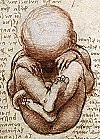
Back Veroudering Afrikaans شيخوخة Arabic Avieyamientu humanu AST Paggurang BCL Стареене Bulgarian জরাগ্রস্ততা Bengali/Bangla Starenje BS Envelliment humà Catalan Stárnutí Czech Alderdom Danish
| Part of a series on |
| Human growth and development |
|---|
 |
| Stages |
| Biological milestones |
| Development and psychology |
Ageing (or aging in American English) is the process of becoming older. The term refers mainly to humans, many other animals, and fungi, whereas for example, bacteria, perennial plants and some simple animals are potentially biologically immortal.[1] In a broader sense, ageing can refer to single cells within an organism which have ceased dividing, or to the population of a species.[2]
In humans, ageing represents the accumulation of changes in a human being over time and can encompass physical, psychological, and social changes.[3][4] Reaction time, for example, may slow with age, while memories and general knowledge typically increase. Ageing is associated with increased risk of cancer, Alzheimer's disease, diabetes, cardiovascular disease, increased mental health risks, and many more.[5][6] Of the roughly 150,000 people who die each day across the globe, about two-thirds die from age-related causes.[7] Certain lifestyle choices and socioeconomic conditions have been linked to ageing.[8]
Current ageing theories are assigned to the damage concept, whereby the accumulation of damage (such as DNA oxidation) may cause biological systems to fail, or to the programmed ageing concept, whereby the internal processes (epigenetic maintenance such as DNA methylation)[9] inherently may cause ageing. Programmed ageing should not be confused with programmed cell death (apoptosis).
- ^ Smadent.com (2021). "Age Calculator". Smadent. 2 (1). Retrieved 12 February 2021.
- ^ Liochev SI (December 2015). "Which Is the Most Significant Cause of Aging?". Antioxidants. 4 (4): 793–810. doi:10.3390/antiox4040793. PMC 4712935. PMID 26783959.
- ^ "Understanding the Dynamics of the Aging Process". National Institute on Aging. Retrieved 19 May 2021.
- ^ Prakash IJ (October 1997). "Women & ageing". The Indian Journal of Medical Research. 106: 396–408. PMID 9361474.
- ^ Ahmed AS, Sheng MH, Wasnik S, Baylink DJ, Lau KW (February 2017). "Effect of aging on stem cells". World Journal of Experimental Medicine. 7 (1): 1–10. doi:10.5493/wjem.v7.i1.1. PMC 5316899. PMID 28261550.
- ^ Renstrom, Joelle (2 March 2020). "Is Aging a Disease?". Slate Magazine. Retrieved 16 January 2022.
- ^ Grey, Aubrey D. N. J. de (21 December 2007). "Life Span Extension Research and Public Debate: Societal Considerations". Studies in Ethics, Law, and Technology. 1 (1). doi:10.2202/1941-6008.1011. ISSN 1941-6008.
- ^ Salvestrini V, Sell C, Lorenzini A (3 May 2019). "Obesity May Accelerate the Aging Process". Frontiers in Endocrinology. 10: 266. doi:10.3389/fendo.2019.00266. PMC 6509231. PMID 31130916.
- ^ Miller, Freda D.; Kaplan, David R. (February 2007). "To Die or Not to Die: Neurons and p63". Cell Cycle. 6 (3): 312–317. doi:10.4161/cc.6.3.3795. PMID 17264677. S2CID 24939720.